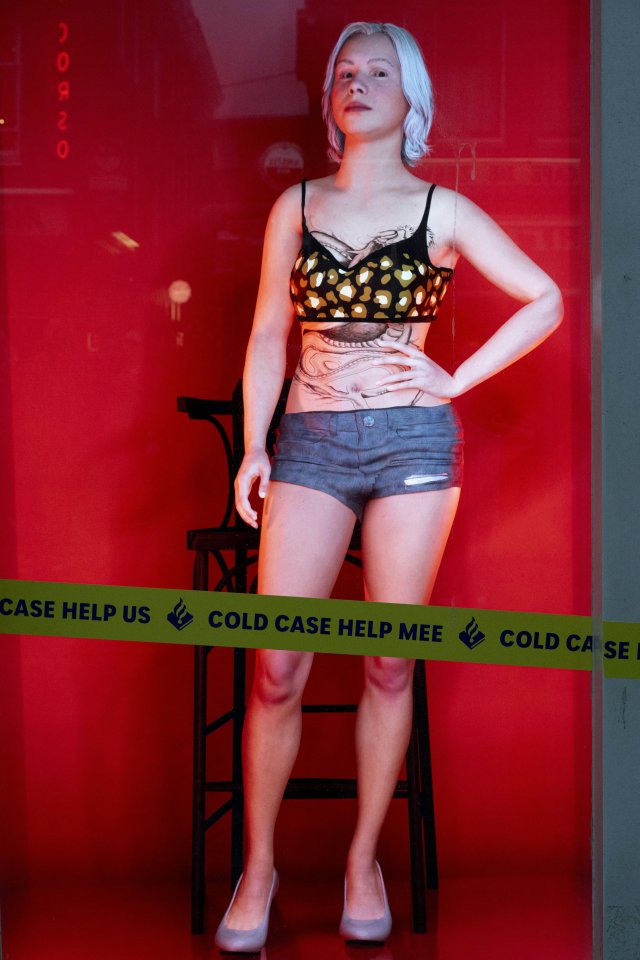A MURDERED sex worker in Amsterdam who was brought back to life in a haunting hologram has sparked a flurry of tips that could finally solve the killing.
Bernadett “Betty” Szabo was found in a pool of blood with multiple stab wounds along the city’s infamous Red Light District in February 2009.
AFPA hologram of murdered sex worker Bernadette Szabo implemented by Dutch police in hope to uncover new information around her murder[/caption]
Amsterdam PoliceBetty Szabo was brutally murdered – but no one was ever caught[/caption]
AFPPedestrians walk past a hologram representing murdered sex worker Betty[/caption]
In a last chance to catch the young woman’s killer 15 years after her death, cops used a life-size hologram replica of Betty.
And cops have now received an influx of tips, a police spokesperson told The Sun.
The visualisation of Betty shows her sitting on a stool behind a window.
She’s dressed in grey heels, denim shorts and a leopard print bra with a large tattoo of a dragon trailing up her torso while she reaches out to people walking past in the Red Light District.
The 3D rendering of the murdered woman shows her leaning forward and breathing on the glass – revealing the word “help”.
Detectives hoped the hologram appeal would take viewers back to 2009 and jog memories of whether they saw her or visited her – and it was successful.
Police spokesperson Eline Roovers in Amsterdam revealed how the hologram has opened up new leads in the case.
She told The Sun: “We’ve got loads of tips. We have not received the ultimate tip, the golden tip, yet.
“We are investigating all of these tips and trying to see if there are any more leads we can investigate further.
“We gathered evidence at the scene at the time – so that’s something that will give us nowadays leads and new traces we can investigate.”
The young girl from Hungary moved to Amsterdam when she was 18 before working as a sex worker in the Red Light District.
Cops said Betty had given birth only three months before she was murdered in her workplace.
Her baby son was placed into foster care and “never had the chance to know his mother”due to the cruel killing, Anne Dreijer-Heemskerk of the cold case team described.
On the night she was brutally killed, two people she worked with noticed she wasn’t in her usual spot on the Oudezijds Achterburgwal – a street and canal – and decided to check on her.
They discovered Betty in a pool of blood with multiple stab wounds.
Amsterdam police say they launched a large investigation after her body was tragically found – with cops reviewing CCTV footage and speaking to any witnesses.
But the case went cold after detectives weren’t able to find a suspect.
Before deciding to use the hologram, the team discussed it “extensively” within the police force – as well as her loved ones.
Ms Roovers said the murdered sex worker’s relatives “really support” them as they hope to get to the bottom of the heinous crime.
Amsterdam PoliceBetty captured on CCTV before her death[/caption]
Amsterdam PoliceBetty moved to Amsterdam at 18 years old from Hungary[/caption]
AFPThe hologram of Betty has attracted considerable attention[/caption]
She added that the family are “eager to help” and “positive” about the way the police approached her case years later.
Cops believe that someone will have information to share.
They hope the hologram of Betty will “help people feel a connection to her” – encouraging them to come forward with any information.
Amsterdam attracts millions of tourists per year, partially drawn by the city’s liberal stance when it comes to drugs and buying sex.
Buying sex is legal and regulated in the Netherlands – as long as it is between two consenting adults – drawing people far and wide to the Red Light District.
It means that those who know what happened to young Betty could be from anywhere around the world, cops said.
Ms Roovers said: “This is a really international scene.
“Lots of people from different nationalities pass by every day.
“So we were really hoping to find ways to reach a bigger audience than just in the Netherlands because we know that there must be people out there that have more information.
“We know that people that, for example, commit a murder, usually tell multiple people about what they’ve done, which means that we know there must be people out there that have more information.”
Despite the cold case being more than a decade old, Ms Roovers said police have always been touched by the case – and Betty’s story.
She explained how Betty’s murder was an “extremely tragic story” – having been so young and just given birth before returning to sex work to make money.
Ms Roovers added: “We have officers that up until this day were touched by her story and really wanted to solve the case.”
The use of a hologram to help solve Betty’s case sparks questions on what the future of solving crime may look like.
It’s unclear whether any other forces worldwide have used the futuristic technique before – but Ms Roovers says that Betty’s case so far has been a “success”.
And it could lead to more holograms to be created.
The hologram was created using 3D visualisation techniques and is the first time Amsterdam police has ever used to try and solve a case.
Benjamin van Gogh, co-ordinator of Amsterdam’s investigative communication team, called it “unique” and “daring”.
He said: “We want to do right by Betty, her loved ones, and the case.”
Police are also offering a £25,000 (€30,000) reward for information that helps solves Betty’s case and, as Ms Roovers described, “achieve justice”.
AFPA pedestrian walks past a hologram representing murdered sex worker Bernadette Szabo[/caption]

